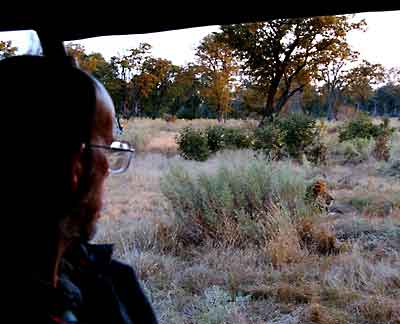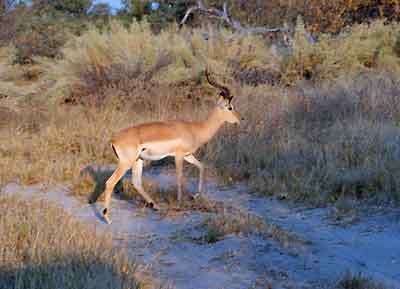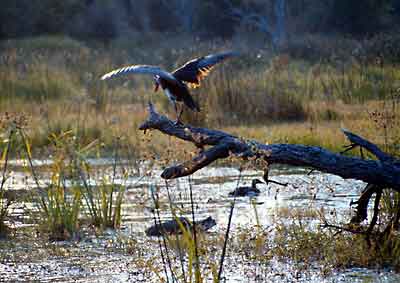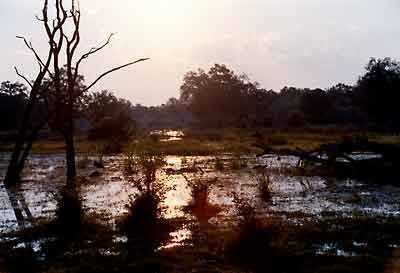Chapter 8: One Could Get Used to This 'Roughing It" Business...
Up to this point, the term "safari camp" was not one that filled me with a great deal
of fondness, given our experience at the eclipse camp. As we climbed into the Botswana
sky, I was picturing another week of sleeping on a hard steel prison-style bunk, mediocre
chow, Spartan conditions, and just a lot less gentility than I like from my vacation dollar
(especially six thousand of them). When we touched down out in the middle of nowhere
on a wide spot of dirt with "runway markers" made from strips of white corrugated tin
laid on the ground, I was wistfully wishing for a flood or something that would force us
to return to the Vic Falls Lodge.
OK, so I'm not right all the time.
The good folks at Camp Moremi really saw me coming, and they knew
how to deal with my type. In general, the camps in Botswana turned out to be great, but
Moremi was the unquestioned high point of the trip, let me just get that out of the way at
the top.
|
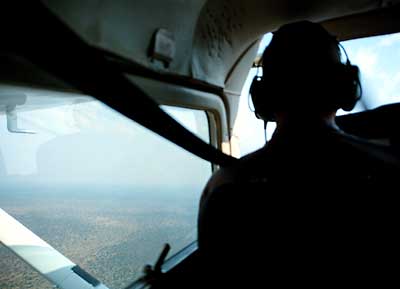
The bush plane to Moremi |
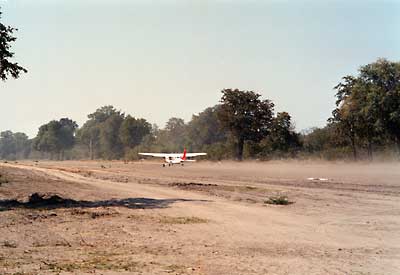
A dirt clearing in the trees: the airstrip at Moremi
Photo by Pam Bloxham |
We were greeted at the airstrip by a new set of local guides with their familiar bush
jeeps, and by David, the manager of the camp. OK, now I'm jumping ahead again here,
but let me go on about this guy for a second. Think of the great BBC TV
series "Fawlty Towers," with John Cleese as the comically nasty, inept hotel manager
Basil Fawlty. Got that? Now think of the anti-Basil, an immediately-likable,
charming, witty individual who seems to be a born host, who is not only good...nay, great
at his job, but actually gives you the impression he enjoys doing it. OK, so
David wasn't all that, but near as, dammit. In a world where fewer and fewer
people seem to give a hoot about their job any more, just the mere fact of a person in
charge who seemed to like his work and was good at it to boot is enough to make Camp
Moremi a must-visit. Unfortunately, he's not the regular manager, so my whole rant here
kinda falls down. But I digress... |
As I said before, the guide you start with tends to be the one you stay with, so we
played jeep roulette once again, and got lucky this time. We wound up under the wing of
Calistus Mpala (Cal for short), the camp's most experienced guide. Since it was getting a
little late in the afternoon, our luggage was taken on ahead and we went directly out on a
game drive, and I began to get an inkling of the differences between our previous
experience and what was in store for us on the rest of the trip.
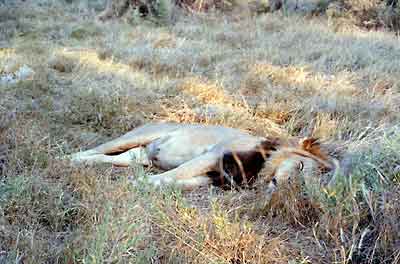
A lazy, snoozy lion |
In Zimbabwe, we rarely got very close to the animals, especially in Mana Pools.
They all just seemed to be too wary of humans, vehicle or no. It was different in the
Botswana wilderness, most of the animals seemed to be completely acclimated to the
presence of the vehicles, and we were able to get quite close to a lot of
animals...sometimes uncomfortably close. At one point, Cal pulled over and
said, "lion." We started scanning the horizon with our binoculars, but he pointed to a spot
not 10 meters away. It took us a second, but we realized we were seeing a large male lion
laying on his back in the grass. He wasn't moving at all, and I thought he was dead at
first, but if you looked closely, you could see him breathing. He was just sacked out,
that's all. |
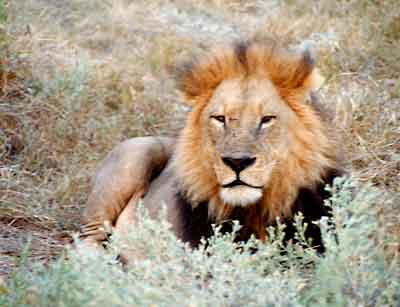 |
Later in the drive, we came back around that way, and the lion was right side
up. We got even closer this time, but the lion just didn't give a fig about us, he
was fed and lazy, and he couldn't recognize us in the jeep as People McNuggets. Also, he
was busy socializing. Every once in awhile, he would roar out a "song," a sequence of
decreasing-length roars that Cal said was his way of locating other lions in the area.
 Click here to hear the lion Click here to hear the lion
calling his buddies.
Near the end of the drive, when it was rapidly starting to get dark, we caught a brief sight of
our first giraffe. |
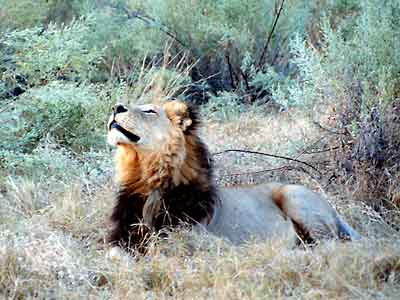
"This is my best side." The lion sniffs the air, checking for other lions |
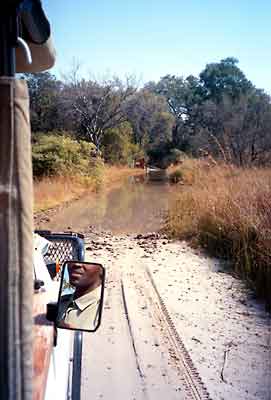
Cal prepares to navigate the moat
Photo by Kathy Lindquist |
After an hour or so, we headed into camp, and discovered "the moat." Just outside
the main gate of the camp, the always-shifting waters of the Okavango Delta had created
a small, meter-deep lake across the road. Cal told us to pick up any stuff we had laying on
the floor of the vehicle, and we plowed in. At the deepest point, the floor of the jeep was
awash, but we made it to the other side. Having to drive through this water every time
anyone went in or out of camp was really rough on the vehicles, and they occasionally
got stuck and had to be towed out. So one might reasonably ask why the camp owners
don't do something about it. Well, they can't. To keep the national wildlife
preserves as pristine as possible, the government sets very strict rules on the camps. They
aren't allowed to divert water, for example. David later said that the camp had applied for
permission to build a bridge across the water, and it was under consideration. |
To add to my rapidly-growing appreciation of this place, Charlotte, David's charming
and excessively attractive fiancée (lucky sod...) was waiting for us at the gate with a
cooler full of warm moist towels to refresh ourselves with. "Oh, yeah," I thought, "I'm
gonna like it here." And I was back to being right. All during our all-too-brief
stay at Moremi, Charlotte was always waiting for us, smiling winsomely, with the towels
when we came back in out of the bush. She was considerably more quiet and reserved
than David, but charming nonetheless, and I got the impression that she probably handled
a lot of the behind-the-scenes work that allowed David to get out and schmooze with the
guests. The pair of them were absolutely first-rate hosts.
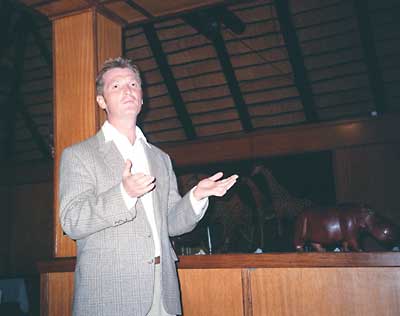
David schmoozing |
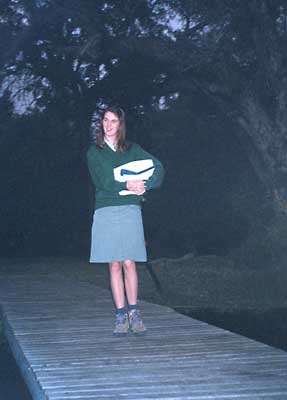
Charlotte with her towels
Photos (2) by Kathy Lindquist |
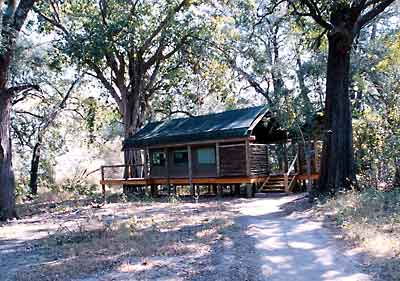 |
And the facilities in the camp. Wow. To call the accommodations "tents" is to do
them a great disservice. Although tents they are, you'd scarcely know it without looking
closely. They are built up on permanent, raised wood platforms, and are easily as large as
any hotel room, with real beds (indeed, very good beds) and other furniture inside.
Indeed, they are really indistinguishable from a "real" room from the inside. Each room
has a viewing deck with chairs where you can sit out and watch the wildlife, and a rather
luxurious bathroom. The bathrooms are separate from the rooms, but only across a short
space on the deck, and reasonably safe to cross even at night. The rooms and bathrooms
have two electric light systems, one that runs off the camp generator when it's on, and a
second, smaller set that runs off batteries and is available 24 hours a day. The tap water in
the camp is perfectly safe to drink. |
Pam and I got to our room to find our luggage already there. On one of the tables was
a water carafe that had ice---ice! in it, and a jar of fresh, still-warm macaroons. Not for
the last time that day, I said to myself "oh, yeah. I'm gonna like it here."
The people at Moremi were not only more attentive to our comfort, but our safety as
well. We were warned not to walk the paths between the rooms and the dining room after
dark, an escort would come around and collect us as a group. In retrospect, I think all that
walking between the room and the boma after dark that I did back in the Zimbabwe camp
was probably pretty dangerous. The escorts at Moremi were armed only with powerful
flashlights, guns being another thing not allowed in the wildlife preserves. The doors on
the rooms and bathroom had no keyed locks, but had turn-bolts, and we were told to
always lock them when we weren't in the room. The monkeys had learned how to work
the door handles, and could get in and make quite a mess but they hadn't figured out the
bolts...yet. |
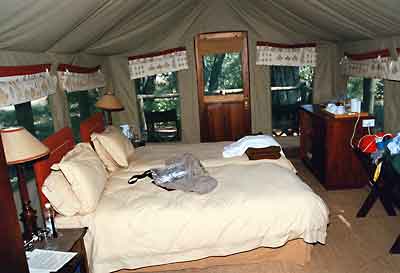 |
But just then, they were busy with other things. Baboons sleep up in the trees at night
for safety, and the higher up in the social order a baboon is, the higher the branch it gets
in the tree. That way, if a leopard comes looking for a midnight snack, it will snag one of
the junior members first. It's like the method for avoiding becoming lion food on a hike:
you don't have to outrun the lion, you just have to outrun the guy next to you.
So around sunset, there's quite a commotion as the baboons wrangle for dominance
and the higher branches. You hear this increasingly-shrill monkey alarm as an interloper
tries to climb too high and is finally rebuffed:
ooo.oooo.OOOO.OOOOOO!.OOOOO!!!!..AAAAUUUUUGGGHHHHH!
At dinnertime, camp staffers came around and got us, and we all headed to the main
dining/social building, a permanent two-story building that held the dining room, a
lounge, a game viewing deck upstairs, a library, a game room, and a bar. An open bar. A
quite well-stocked open bar. The Okavango safari camps are expensive, but meals and
drinks are included. They do charge a bit for a few of the snootier beverages,
like Glenfiddich or champagne, but a person can get quite well-lubricated on the
extensive free stock. Like the free Amarula. Say it with me: f-r-e-e Am-a-ru-la....We
spent a half-hour or so drinking and socializing, then we were called into dinner.
At the Botswana camps, we saw none of the ugly racial divide we'd glimpsed in
Zimbabwe. We never saw any of the black staff treated as anything less than
professionals by the management. David and Charlotte, as well as a couple of the guides
sat down with us at dinner, and they started the meal by having the chef come out and
announce the menu. The company that runs Moremi also runs two other camps in the
area, and we learned that the company actively encourages the employees to work their
way up in the organization. DJ, our capable bartender, was studying to become a safari
guide. Mary, the chef, had started out as one of the maids. All of them seemed to
genuinely enjoy their jobs.
David and Charlotte were not the regular managers of Moremi, but rather rotated
around the camps, providing vacation relief. The company's policy is that camp
managers have to be married couples, but they'd been letting D&C slide for awhile, while
slowly increasing the pressure for them to tie the knot. Their wedding was going to be at
Moremi, and last a week. They are from England, so many of the wedding guests were
flying in from quite a distance. Sounded like it was gonna be quite a bash.
The dinner was excellent, especially the vegetable soup we started off with. DJ was
always hovering nearby with some rather nice wine, and it was just an outstanding meal
all around. During the course of dinner, David held forth on his opinion of Lariam, the
anti-malaria drug most of us were taking. He didn't care for it. He said that some 80% of
the medical evacuations they had to do from the camps were due to Lariam side-effects,
some of which sounded pretty nasty. He said people just suddenly went wacko or
catatonic from the drug, frequently on their third dosage...which, ominously, was coming
the following day for us.
After dinner, we retired outside to the campfire and passed around the bottle of
Amarula, and this all went a long way to erasing the memories of delayed planes and
primitive camps. That night, and all during our stay in Botswana, it wasn't really cold at
all at night, and I ended up not needing my heavy thermal underwear at all after
Zimbabwe. But in another nice touch, we found hot water bottles tucked up under the
sheets of our bed to keep the bed warm.
PAGE: 1 |
2 |
3 |
4 |
5 |
6 |
7 |
8 |
9 |
10 |
11 |
12 |
13 |
14 |
15
All photos and text are ©2001, and may not be used without permission





